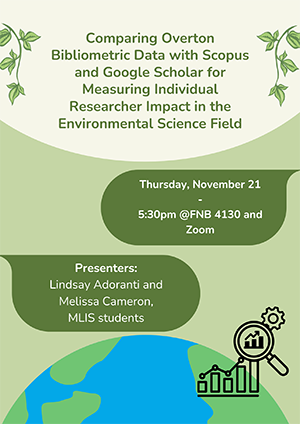Comparing Overton Bibliometric Data with Scopus and...
Room: 4130 (or Zoom)
"Comparing Overton Bibliometric Data with Scopus and Google Scholar for Measuring Individual Researcher Impact in the Environmental Science Field"
Presenters: Lindsay Adoranti and Melissa Cameron, MLIS students (Western University)
All are welcome to attend.
Part of the 2024/25 Mediations Lecture Series.
Attend in-person: FNB 4130
Attend online: Zoom link
Abstract: Bibliometrics is an important aspect of determining the research impact of a scientific article. Although the research impact of an article can be measured in several ways, citation counts are a popular and straightforward method to determine the number of times a research article is cited in another article or book. In the science, technology, engineering, and math (STEM) fields, Scopus and Google Scholar are two tools that can be used to determine citation counts of STEM research. However, the extent to which Google Scholar and Scopus index policy citation counts of STEM articles is unknown. This research compared the citation counts between Google Scholar, Scopus, and a policy database called Overton using 25 environmental science scholarly articles from 5 different authors. This research seeks to identify the citation count differences between the three tools to identify gaps in citation count metrics in the environmental science field. This study concludes that Overton overwhelmingly identifies policy citation counts that are not found by Google Scholar or Scopus and thus, is an important database to consider when analyzing citation counts in the environmental science field. This research is significant because determining scientific articles’ impact in the policy field demonstrates how scientific literature can make real world impacts.






